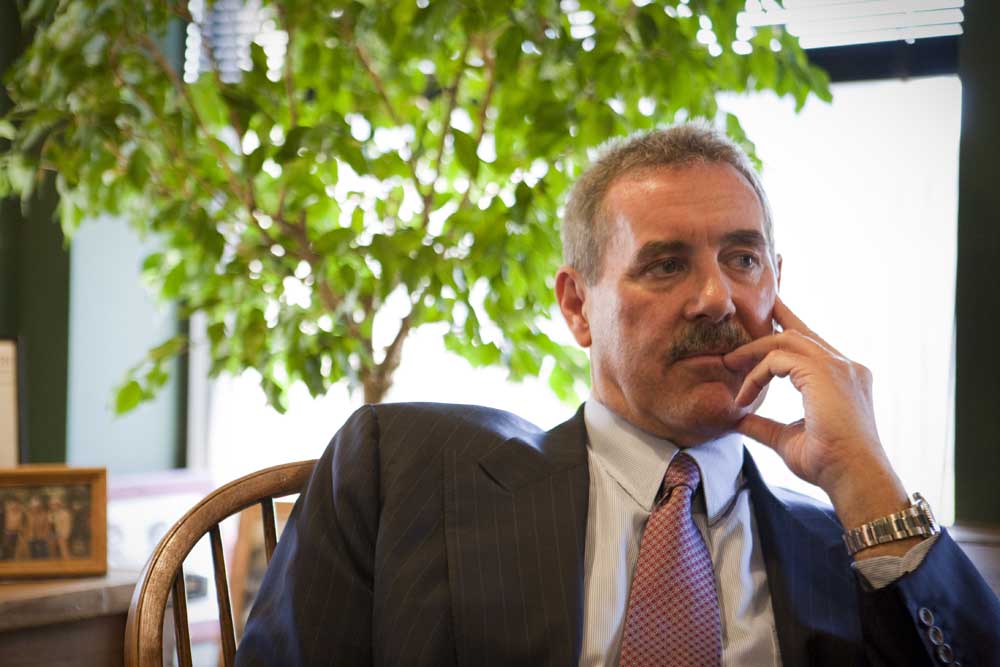Cook Islands, a paradise of untouchable assets
Published 12:00 am Sunday, December 22, 2013

- New York Times News ServiceAllen Stanford, then the chairman of Stanford Financial. Stanford, since convicted for masterminding a $7 billion Ponzi scheme, is one of hundreds who have hidden funds in the Cook Islands.
Picture a paradise where you can be lawsuit-proof. A place to hide your hard-earned assets far from the grasp of former or soon-to-be-former spouses, angry business partners or, if you happen to be a doctor, patients who might sue you.
Lawyers drumming up business say they have found just the place: the Cook Islands. And, thanks to a recently released trove of documents, it’s become clear that hundreds of wealthy people have stashed their money there, including a felon who ran a $7 billion Ponzi scheme and the doctor who lost his license in the Octomom case.
These flyspeck islands in the middle of the Pacific would be nothing more than lovely coral atolls, nice for fish and pearls, except for one thing: The Cooks are a global pioneer in offshore asset-protection trusts, with laws devised to protect foreigners’ assets from legal claims in their home countries.
The Cayman Islands, Switzerland and the British Virgin Islands capture headlines for laws and tax rates that allow multinational corporations and the rich to shelter income from the American government. The Cook Islands offer a different form of secrecy. The long arm of U.S. law does not reach there. The Cooks generally disregard foreign court orders, making it easier to keep assets from creditors, or anyone else.
Win a malpractice suit against your doctor? To collect, you will have to go to the other side of the globe to plead your case again before a Cooks court and under Cooks law. That is a big selling point for those who market Cook trusts to a broad swath of wealthy Americans fearful of getting sued, and some who have been.
“You can have your cake and eat it too,” said Howard Rosen, a lawyer in Coral Gables, Fla., who has set up Cook trusts for more than 20 years, in a video on his website. Anyone with more than $1 million in assets, his firm’s site suggests, should consider Cook trusts for self-preservation, but especially real estate developers, health care providers, accountants, architects, corporate directors and parents of teenage drivers.
International regulators have become more aggressive in efforts to clamp down on tax haven countries, offshore banks and their customers, but they have paid scant attention to the Cooks. Yet Americans are the biggest customers of the trusts, which may be held only by foreigners, not Cook Islanders. The islands’ official website calls the Cooks a “prime choice” for “discerning wealthy clients.” There are 2,619 trusts, according to the Cooks’ Financial Supervisory Commission, offering anonymity as well as legal protections. The value of the assets is not disclosed and it is against the law in the Cooks to identify who owns the trusts or to provide any information about them.
But a cache of documents obtained by the International Consortium of Investigative Journalists, based in Washington, reveals the owners of about 700 Cook trusts. The Cook data were among 2.5 million documents containing information about customers of offshore havens throughout the world. Earlier this year, the release of some of those documents, disclosing the names of tax-averse companies or government officials and their close allies, caused an international furor.
A close study of the Cook Islands documents by The New York Times and the international consortium shows that these trusts are popular with the wealthy in Palm Beach, Fla., New York and Hollywood. The trust owners include people who have been convicted of Medicaid fraud, Ponzi schemes and bilking employee pension funds. Many others are simply rich.
Cook trusts provide security along with secrecy, officials say. “Asset protection is to provide a layer of insurance for something that cannot be insured — the unforeseeable,” said Jennifer Davis, chief executive of the Cook Islands Financial Services Development Authority.
Doctors and lawyers
There is nothing illegal about setting up a Cook trust, and putting assets into one does not eliminate the requirement to pay taxes on those assets’ earnings. But the trusts have a following among those who suspect they could be sued: doctors facing malpractice suits, businessmen avoiding creditors and some who have been sued by the federal government.
R. Allen Stanford, who is serving a 110-year term for masterminding a $7 billion Ponzi scheme, had a “Baby Mama Trust” in the Cook Islands, named after a mistress with whom he had two children and who was the trust’s beneficiary. “Baby Mama” contained proceeds from the sale of a $2.5 million Florida home — proceeds that were held in Swiss and Isle of Man accounts and are now among 30 offshore accounts subject to a forfeiture order to pay Stanford’s victims.
Lawyers often aim their Cook trust pitches at doctors, many of whom say they fear frivolous malpractice claims. But the trusts can also protect those who have committed serious transgressions. Dr. Michael Kamrava, who lost his medical license after implanting embryos allowing Nadya Suleman, the so-called Octomom, to give birth to octuplets, placed his interest in a Beverly Hills surgery center and a Swiss bank account in his “Athena Trust.”
There is also Dr. James Naples, a Texas podiatrist who pleaded guilty in 2004 to federal charges of obstructing justice in connection with treating cancer patients with a pesticide and then billing Medicare and insurance companies. Another Cook trust holder is Dr. Richard Edison, a Fort Lauderdale, Fla., plastic surgeon, called “Dr. Dread,” who was sued after five patients at his Florida plastic surgery clinic died and he left a medical sponge in a woman’s breast. After the 2004 death of a patient, the Florida health department restricted his medical license.
“There will always be a need for these trusts,” said Bernard Singer, the Florida lawyer who set up the trust for Edison. “A lot of people are concerned that we live in a litigious society, and they want to be protected.” He added that Edison voluntarily settled with his patients. He said they never went after the doctor’s trust assets, which, documents show, included a $1.6 million Austrian bank account set up after he was sued in the sponge incident.
Critics of Cook trusts say they undermine the basic premise of the American legal system, which is to hold people accountable for the consequences of their actions. “U.S. jurisdiction stops at the Pacific and on the beach,” said Jay Adkisson, a California lawyer and critic of offshore trusts. “Nothing will happen. That’s why those with Cook trusts include a high number of the unscrupulous who have committed fraud and are trying to hide their ill-gotten gains.”
Even the U.S. government has had a hard time going up against a Cook trust. In a lawsuit that has dragged on for years, Fannie Mae, a government-sponsored lender, is still waiting to collect on a $10 million judgment against an Oklahoma developer who defaulted on his loans. In legal filings, Fannie Mae says it has collected only $12,000 — and “that is not for lack of trying.” The “clear purpose” of the trust, Fannie Mae’s complaint said, “is to avoid payment of the judgments obtained by Fannie Mae,” efforts that the agency called “brazen.”
Welcoming Americans
Americans have parked approximately $1 trillion in offshore accounts around the world, and the U.S. government has begun to make an issue of it. But the Cooks, a self-governing state associated with New Zealand, have gotten little attention from U.S. regulators or legislators so far, perhaps because the islands do not appear to have been widely used by multinational corporations to avoid paying taxes and because they have not been linked to terrorist financing or money laundering.
In August 2012, Hillary Clinton became the first secretary of state to visit the islands. Her public remarks on the main island, Rarotonga, did not contain a word about the trusts. A Congressional Research Service study on tax havens released in January cited offshore trusts, in the Cooks and elsewhere, as possible conduits for evading taxes, with little follow-up.
“There’s been a lot of pressure on the Caymans and other places to clean up,” said Heather Lowe, director of government affairs at Global Financial Integrity, a Washington research and advocacy group. “There are many areas where pressure is not exerted, and the Cooks is one of them. Using a Cook trust to hide assets from your spouse may not make the headlines.”
The Cooks law was written with Americans in mind. In fact, it was drafted by a Denver lawyer, Barry Engel. A Cook official, seeking revenue for the islands, read in The Economist about Engel’s firm, which was pioneering the concept of asset protection trusts, and hired Engel to help write the 1989 law.
“Lawyers can debate the morality of these trusts,” said Engel, who has established more than 1,300 Cook trusts. “My first duty is to my clients and my clients have a need. This is in response to a legal system that has spun a little out of control and is abused by lawyers for legal extortion and who can throw someone’s life into a tailspin. Trusts are our response to that abuse of the legal system.”
Advantage in negotiation
The newly released documents show that many trusts were set up just before or while some Cook clients engaged in activities that later got them into trouble.
For example, in 2001, Robert Harvey set up the “Lo-Ry Principle International Trust” and by 2004 it contained $1.2 million. That is the same year, according to the Securities and Exchange Commission, in which he helped mastermind a Ponzi scheme that bilked investors of $52 million over the next two years. In 2010, Harvey was permanently barred from the securities industry. A lawyer representing him said he was not aware that Harvey had a Cook trust, which he closed in 2007. Nor were his victims.
Lawyers who arrange Cook trusts see them as a negotiating tool: If litigation arises, many creditors will settle for cents on the dollar, rather than face the expense of a long and difficult lawsuit halfway across the Pacific.
“You are paying blood money to stop the madness,” said Jeffrey Verdon, a lawyer in Newport Beach, Calif., who sets up Cook trusts. Verdon said he settled a $78 million judgment for $7 million and a $5 million one for $100,000. Since settlements are private, those numbers could not be verified.








